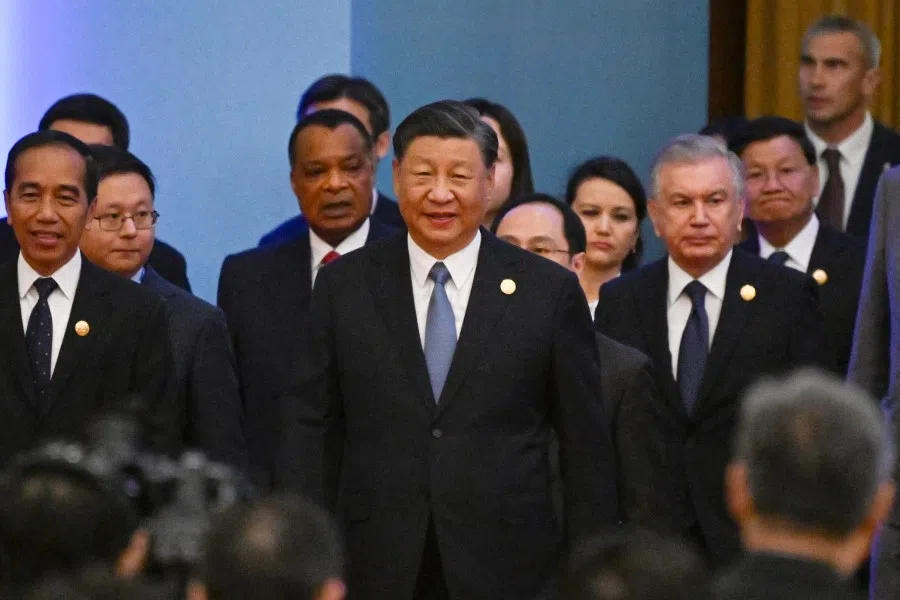Impact of Gaza crisis on China's interests in the Middle East and Asia-Pacific
China would seek to prevent a wider escalation in the conflict between Israel and Hamas. It is also monitoring whether US involvement in the conflict will affect Washington's focus on constraining Beijing in Asia.

China has worked actively to de-escalate the Gaza crisis. It is motivated by deep concern that escalation will trigger a wider regional war that seriously damages China's substantial economic interests in the Middle East. China can also be expected to monitor whether US entanglement in the Gaza crisis dilutes Washington's focus on constraining China in Asia.
The Middle East has become a key node for China's Belt and Road Initiative (BRI). According to Professor Wu Bing Bing, director of the Institute of Arab and Islamic culture at Beijing University, China now sees the Middle East as part of its greater periphery.
Since the BRI was launched a decade ago, Chinese investments and projects in MENA (Middle East and North Africa) between 2005 and 2022 grew to US$273 billion. In 2021, MENA accounted for 28.5% of China's overseas investments. Trade between China and the Gulf Cooperation Council (GCC) stood at US$330 billion in 2021, making China the GCC's biggest trading partner.
Pushing for ceasefire
In both public and private statements, China has focused on de-escalating the conflict, preventing a humanitarian disaster in Gaza and getting back to negotiations towards a two-state settlement. In his private calls with US Secretary of State Antony Blinken and Israeli Foreign Minister Eli Cohen, Chinese Foreign Minister Wang Yi emphasised the need for restraint by Israel. On 14 October, Wang Yi told Blinken that military options only create more violence and urged the US to work towards a political settlement. In his call with Cohen on 23 October, Wang Yi emphasised the urgency of preventing the Gaza crisis from escalating.
At the Third BRI Forum on 20 October, Xi Jinping stressed that de-escalation was the priority to allow for an eventual return to peace talks. China will probably use its time as the rotating president of the UN Security Council in November to push even harder for a ceasefire.
Given China's economic interests in the region and its nascent leadership in brokering detente between Saudi Arabia and Iran, China will probably strongly urge Iran against intervention in Gaza.

So far, China does not appear to have urged Iran to exercise restraint. In his call with Wang Yi on 15 October, Iranian Foreign Minister Hossein Amir-Abdollahan said that Iran hoped to resolve the conflict through political means. Given China's economic interests in the region and its nascent leadership in brokering detente between Saudi Arabia and Iran, China will probably strongly urge Iran against intervention in Gaza.
China sees maintaining its influence in the Middle East as vital now that the region is a key node in the BRI. Retaining Arab support underpins China's refusal to explicitly condemn Hamas for its 7 October attack, and its criticisms of Israel's response as going beyond self-defence to collective punishment of Palestinians.
Prior to the latest crisis, the Chinese assessment was that the Abraham Accords and Netanyahu's reluctance to address legitimate Palestinian concerns made fresh violence likelier. Wang Yi told Brazil's Celso Amorin, special adviser to Brazilian President Luiz Inacio Lula da Silva, in their 15 October call that the lack of justice for the Palestinian people is the crux of the Palestinian issue.
Affecting Beijing's decision on Taiwan
Shared Chinese and American interest in preventing the Gaza crisis from escalating into a wider regional war gives China a narrow opening for improving the atmosphere of China-US relations. China will have to assure Washington that it will work on dissuading Iran from intervening in the Gaza conflict. China is probably prepared to give assurances behind closed doors, but not in public.
Whether US defence commitments to Israel slow the pace of current US efforts to improve Taiwan's ability to repel and resist a Chinese attack, will influence China's calculations about the need for an attack on Taiwan.

China will be watching closely how the Gaza crisis affects US attention on Taiwan and territorial disputes in the South China Sea. Whether US defence commitments to Israel slow the pace of current US efforts to improve Taiwan's ability to repel and resist a Chinese attack, will influence China's calculations about the need for an attack on Taiwan.
If these efforts slow down or stall, Beijing will see less need and urgency to carry out a costly attack on Taiwan. But China will keep up its incursions into Taiwan's air defence identification zone (ADIZ) as it sees them as necessary to deter Taiwan from going for independence. Any drop in US attention for Taiwan will be used by China to try and promote support for closer ties with China among Taiwanese.
A drop in US attention to the South China Sea would encourage China to double down on its strategy. It may even be tempted to consider more forceful measures against Philippine vessels.
More aggressive in the South China Sea?
In the South China Sea, tension has been rising around the Second Thomas Shoal. During the presidency of Rodrigo Duterte, China had prevented Philippine vessels from repairing the crumbling World War Two-era BRP Sierra Madre, a tank landing ship (LST) on which the Philippines had stationed a garrison.
On 4 and 22 October, Chinese vessels tried to stop resupply missions to the Philippine garrison as well. The latter incident resulted in a collision between Philippine and Chinese coast guard vessels. It appears that China's strategy is to make it untenable for the Philippines to maintain its garrison by preventing resupply for the garrison and repairs to the disintegrating LST.
A drop in US attention to the South China Sea would encourage China to double down on its strategy. It may even be tempted to consider more forceful measures against Philippine vessels.
China can be expected to keep on pushing for a ceasefire in Gaza as it deems that it has vital and growing interests in a stable Middle East. A US bogged down in the Middle East will incline China to think that time remains on its side, which lowers the risk of China invading Taiwan. But China will be encouraged to double down on its "grey zone" tactics against Taiwan and the Philippines.
In this context, President Biden's response to the 22 October incident at the Second Thomas Shoal that any attack on Philippine aircraft, vessels or armed forces will invoke the US's mutual defence treaty with the Philippines, is a timely reminder to Beijing against assuming that the US cannot keep its eye on both Gaza and the South China Sea.
This article was first published in Fulcrum, ISEAS - Yusof Ishak Institute's blogsite.



![[Video] George Yeo: America’s deep pain — and why China won’t colonise](https://cassette.sphdigital.com.sg/image/thinkchina/15083e45d96c12390bdea6af2daf19fd9fcd875aa44a0f92796f34e3dad561cc)
![[Big read] When the Arctic opens, what happens to Singapore?](https://cassette.sphdigital.com.sg/image/thinkchina/da65edebca34645c711c55e83e9877109b3c53847ebb1305573974651df1d13a)
